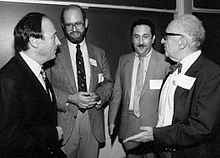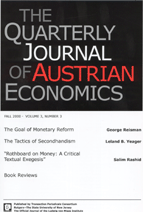Mises Institute
| Founder(s) | Lew Rockwell, Murray Rothbard, Burton Blumert, Henry Hazlitt |
|---|---|
| Established | 1982 |
| Focus | Economics education, Austrian economics, libertarianism, classical liberalism |
| Faculty | 350+[1] |
| Staff | 21 |
| Key people | Lew Rockwell (Chairman) Jeff Deist (President) Joseph Salerno (Editor Quarterly Journal of Austrian Economics) |
| Budget | Revenue: $4,200,056 Expenses: $4,165,289 (FYE 2017)[2] |
| Location | , , United States |
| Website | mises |
| Part of a series on the |
| Austrian School |
|---|
 |
|
|
The Ludwig von Mises Institute for Austrian Economics, or Mises Institute, is an Austrian School of economics and libertarian nonprofit think-tank located in Auburn, Alabama, United States.[3][2] It is named after Austrian School economist Ludwig von Mises (1881–1973).
The Mises Institute was founded in 1982 by Lew Rockwell, Burton Blumert, and Murray Rothbard, following a split between the Cato Institute and Rothbard, who had been one of the founders of the Cato Institute.[citation needed][4] The Institute was funded by Ron Paul.[3]
Background and location

The Ludwig von Mises Institute was established in 1982 in the wake of a dispute which occurred in the early 1980s between Murray Rothbard and the Cato Institute, another libertarian organization co-founded by Rothbard.[citation needed]
Early after its founding, the Mises Institute was located at the business department offices of Auburn University, and relocated nearby to its current site in 1998.[citation needed]
Kyle Wingfield wrote a 2006 commentary in The Wall Street Journal that the Southern United States is a "natural home" for the Institute, as "Southerners have always been distrustful of government," with the institute making the "Heart of Dixie a wellspring of sensible economic thinking."[4]
Economic views
The Institute is founded in Misesian praxeology ('the logic of human action'), that holds that economic science is a deductive science rather than an empirical science. Developed by Ludwig von Mises, following the Methodenstreit opined by Carl Menger, it is a self-conscious opposition to the mathematical modeling and hypothesis-testing used to justify knowledge in neoclassical economics. Externally, this economic method usually is considered a form of heterodox economics.[5]
Criticisms
A 2000 "Intelligence Report" by the Southern Poverty Law Center categorized the Institute as Neo-Confederate, "devoted to a radical libertarian view of government and economics."[6]
In 2003, Chip Berlet of the Southern Poverty Law Center described the Mises Institute as "a major center promoting libertarian political theory and the Austrian School of free market economics", also noting Rothbard's disgust with child labor laws. Other institute scholars hold anti-immigrant views.[7]
In 2017, the president of the Mises Institute, Jeff Deist, gave a speech at the Mises University conference, where in his concluding remarks he stated that the ideas of "blood and soil and God and nation still matter to people".[8] Deist's use of the phrase blood and soil, originally used by the Nazi party as a call for racial nationalism, was alleged by some to be an explicit signal to Neo-Nazis and other white nationalist groups. In particular, Nicholas Sarwark and Arvin Vohra, then the chair and vice-chair of the United States Libertarian Party, condemned Deist's speech, with Vohra stating that "the Mises Institute has been turned into a sales funnel for the White Nationalist branch of the Alt Right". Vohra further accused the Mises Institute as a whole of being "authoritarian, racist, nazi".[9][10]
Publications


The Mises Institute makes available a large number of books, journal articles, and other writings online, and archives various writings on its website. Its Quarterly Journal of Austrian Economics discusses Austrian economics. It published the Journal of Libertarian Studies from 1977 to 2008.[citation needed]
Notable faculty
Notable figures affiliated with the Mises Institute include:[11][non-primary source needed]
- Walter Block – Austrian School economist and anarcho-capitalist; economics professor at Loyola University New Orleans
- Godfrey Bloom- British politician, former Member of the European Parliament
- Thomas DiLorenzo – economics professor at Loyola University Maryland
- Paul Gottfried – Former Professor of Humanities at Elizabethtown College
- Hans-Hermann Hoppe – philosopher, paleolibertarian, business professor at University of Nevada, Las Vegas, and founder of Property and Freedom Society
- Jesus Huerta de Soto – Professor of Applied Economics at King Juan Carlos University
- Peter Klein – Professor of Entrepreneurship and Senior Research Fellow with the Center for Entrepreneurship & Free Enterprise at Baylor University[12]
- Robert P. Murphy – economist, Institute for Energy Research
- Andrew Napolitano – Fox News pundit and former judge
- Gary North – co-founder of Christian Reconstructionism and founder of Institute for Christian economics
- Ron Paul – physician, author, and former congressman
- Ralph Raico (1936–2016) – historian and libertarian specializing in European classical liberalism and Austrian economics
- Murray Rothbard (1926–1995) – heterodox economist, paleolibertarian theorist, polemicist, revisionist historian, and founder of anarcho-capitalism
- Joseph Sobran (1946–2010) – journalist, contributor to American Renaissance and lecturer at the Institute for Historical Review
- Mark Thornton – Austrian School economist[13]
- Joseph T. Salerno – Academic vice president of the Mises Institute, professor of economics at Pace University, and editor of the Quarterly Journal of Austrian Economics.
- Thomas Woods – historian, political analyst, and author
See also
References
- ^ "Mises Academy:What Is The Mises Institute; What We Do". June 18, 2014.
- ^ a b "Mises Institute in Charity Navigator". Charity Navigator. Retrieved June 5, 2019.
- ^ a b Sam Tanenhaus and Jim Rutenberg (January 25, 2014). "Rand Paul's Mixed Inheritance". New York Times. Retrieved February 20, 2014.
- ^ a b Wingfield, Kyle (August 11, 2006). "Von Mises Finds A Sweet Home In Alabama". Wall Street Journal. ISSN 0099-9660. Retrieved December 19, 2020.
- ^ Lee, Frederic S.; Cronin, Bruce C.; McConnell, Scott; Dean, Erik (2010). "Research Quality Rankings of Heterodox Economic Journals in a Contested Discipline". American Journal of Economics and Sociology. 69 (5): 1409–1452. doi:10.1111/j.1536-7150.2010.00751.x.
- ^ "The Neo-Confederates". Intelligence Report. Southern Poverty Law Center. Summer 2000.
- ^ Berlet, Chip (Summer 2003). "Into the Mainstream". Intelligence Report. Southern Poverty Law Center. Retrieved September 24, 2013.
- ^ "For a New Libertarian". July 28, 2017.
- ^ Welch, Matt (July 4, 2018). "Libertarian Party Rebuffs Mises Uprising". Reason Magazine. Retrieved September 18, 2020.
- ^ "Arvin Vohra - Since so many are asking "What's the big... | Facebook". March 11, 2018. Archived from the original on March 11, 2018. Retrieved December 19, 2020.
- ^ "Faculty Members" Ludwig von Mises Institute
- ^ Peter Klein, Baylor University's Hankamer School of Business. Retrieved 22 December 2017
- ^ "Senior Fellows, Faculty Members, and Staff." Ludwig von Mises Institute
External links
- Official website
- EDIRC listing (provided by RePEc)
- Mises Institute
- 1982 establishments in Alabama
- Auburn, Alabama
- Austrian School
- Book publishing companies of the United States
- Educational charities based in the United States
- Libertarian organizations based in the United States
- Non-profit organizations based in Alabama
- Think tanks established in 1982
- Political and economic think tanks in the United States
- Private universities and colleges in Alabama

